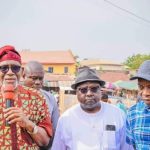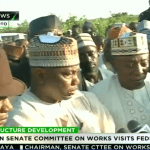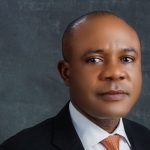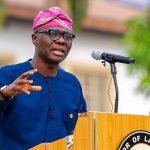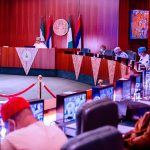Over 900 active road contracts, covering the construction, reconstruction, or rehabilitation of more than 13,000km of Federal roads and highways across the country, out of a total of 35,000km of Federal roads in existence are currently being executed in different parts of the country according to the APC Legacy and Awareness Campaign.
The group, which is a voluntary think-tank group of the governing party, claimed that President Muhammadu Buhari’s Administration has cumulatively devoted significantly more resources to road and transport infrastructure than any other administration since 1999, adding that the results are starting to emerge, in roads, bridges, highways, rail lines and stations, and air and seaport upgrades.
According to the group, the Buhari administration has increased the amount of funding available for road projects, while also ensuring the resumption of work on abandoned projects, adding that in 2016, the President’s first full year in office, the roads budget went up to 260 billion Naira, for which about 200 billion Naira was released, as against a paltry 18 billion Naira budgeted by the past PDP government.
In a statement issued on Wednesday and jointly signed by four leaders of the group: Barr. Ismail Ahmed, Mr. Lanre Issa-Onilu, Mr. Tolu Ogunlesi, Mr. Salihu Mohammed Lukman, the APC Legacy Awareness Campaign revealed that in order to break the financing jinx for large-scale infrastructure projects, the Buhari Administration has implemented a number of landmark and innovative methods.
Notable among the initiatives according to the group are the setting up of the Presidential Infrastructure Development Fund (PIDF), in 2018, with $650m in seed funding, deploying and executing of Presidential Executive Order 7, the Road Infrastructure Tax Credit Scheme, launching of the Highway Development and Maintenance Initiative (HDMI).
Others include approving the establishment of a multi-billion dollar Infrastructure Corporation, InfraCorp, to mobilize and deploy funds towards viable, transformational infrastructure projects, issuance of Sovereign Sukuk Bonds (the first in the country’s history) dedicated to road infrastructure, and approving the National Public Buildings Maintenance Policy, the first in the country, to create an economy out of infrastructure maintenance.
The group noted that all of these initiatives have been carefully designed and introduced to ensure that financing is no longer a challenge for road construction, rehabilitation and maintenance, and to make the private sector a key partner alongside the Government in the development of critical road infrastructure.
Therefore, the APC administration of President Buhari’s first priorities were to increase the amount of funding available for road projects, while also ensuring the resumption of work on abandoned projects.
“In the area of roads and bridges, work has since resumed on several stalled, abandoned or solution-defying road projects that were inherited, like the Loko-Oweto Bridge, Lagos-Ibadan Expressway, Sagamu-Benin Expressway, the Enugu-Port Harcourt Expressway, Onitsha-Enugu Expressway, Kano-Maiduguri Expressway, Abuja-Kaduna-Zaria-Kano Expressway, Obajana-Kabba Road, Ilorin-Jebba Road, Apapa-Oshodi-Oworonshoki Road, and several others are in progress, with some already close to completion.
“A brand new bridge in Ikom, Cross River State, has just been completed, to replace a dilapidated steel truss bridge originally built five decades ago, as has a new border bridge linking Nigeria and Cameroon, in the spirit of regional integration.
“Construction work on the Second Niger Bridge, a contract awarded multiple times between 2002 and 2015, but constantly stalled for lack of funding, finally kicked off in 2018, with guaranteed funding, for the first time in the history of the project.
In 2017, construction finally commenced on the Bodo-Bonny Bridges and Road (linking Bonny Island to the Rivers Mainland), a project first mooted decades ago, and awarded a number of times without success, prior to the Buhari Administration,” the statement reads in parts.
Over 900 active road contracts, covering the construction, reconstruction, or rehabilitation of more than 13,000km of Federal roads and highways across the country, out of a total of 35,000km of Federal roads in existence are currently being executed in different parts of the country according to the APC Legacy and Awareness Campaign.
The group, which is a voluntary think-tank group of the governing party, claimed that President Muhammadu Buhari’s Administration has cumulatively devoted significantly more resources to road and transport infrastructure than any other administration since 1999, adding that the results are starting to emerge, in roads, bridges, highways, rail lines and stations, and air and seaport upgrades.
According to the group, the Buhari administration has increased the amount of funding available for road projects, while also ensuring the resumption of work on abandoned projects, adding that in 2016, the President’s first full year in office, the roads budget went up to 260 billion Naira, for which about 200 billion Naira was released, as against a paltry 18 billion Naira budgeted by the past PDP government.
In a statement issued on Wednesday and jointly signed by four leaders of the group: Barr. Ismail Ahmed, Mr. Lanre Issa-Onilu, Mr. Tolu Ogunlesi, Mr. Salihu Mohammed Lukman, the APC Legacy Awareness Campaign revealed that in order to break the financing jinx for large-scale infrastructure projects, the Buhari Administration has implemented a number of landmark and innovative methods.
Notable among the initiatives according to the group are the setting up of the Presidential Infrastructure Development Fund (PIDF), in 2018, with $650m in seed funding, deploying and executing of Presidential Executive Order 7, the Road Infrastructure Tax Credit Scheme, launching of the Highway Development and Maintenance Initiative (HDMI).
Others include approving the establishment of a multi-billion dollar Infrastructure Corporation, InfraCorp, to mobilize and deploy funds towards viable, transformational infrastructure projects, issuance of Sovereign Sukuk Bonds (the first in the country’s history) dedicated to road infrastructure, and approving the National Public Buildings Maintenance Policy, the first in the country, to create an economy out of infrastructure maintenance.
The group noted that all of these initiatives have been carefully designed and introduced to ensure that financing is no longer a challenge for road construction, rehabilitation and maintenance, and to make the private sector a key partner alongside the Government in the development of critical road infrastructure.
Therefore, the APC administration of President Buhari’s first priorities were to increase the amount of funding available for road projects, while also ensuring the resumption of work on abandoned projects.
“In the area of roads and bridges, work has since resumed on several stalled, abandoned or solution-defying road projects that were inherited, like the Loko-Oweto Bridge, Lagos-Ibadan Expressway, Sagamu-Benin Expressway, the Enugu-Port Harcourt Expressway, Onitsha-Enugu Expressway, Kano-Maiduguri Expressway, Abuja-Kaduna-Zaria-Kano Expressway, Obajana-Kabba Road, Ilorin-Jebba Road, Apapa-Oshodi-Oworonshoki Road, and several others are in progress, with some already close to completion.
“A brand new bridge in Ikom, Cross River State, has just been completed, to replace a dilapidated steel truss bridge originally built five decades ago, as has a new border bridge linking Nigeria and Cameroon, in the spirit of regional integration.
“Construction work on the Second Niger Bridge, a contract awarded multiple times between 2002 and 2015, but constantly stalled for lack of funding, finally kicked off in 2018, with guaranteed funding, for the first time in the history of the project.
In 2017, construction finally commenced on the Bodo-Bonny Bridges and Road (linking Bonny Island to the Rivers Mainland), a project first mooted decades ago, and awarded a number of times without success, prior to the Buhari Administration,” the statement reads in parts.
Over 900 active road contracts, covering the construction, reconstruction, or rehabilitation of more than 13,000km of Federal roads and highways across the country, out of a total of 35,000km of Federal roads in existence are currently being executed in different parts of the country according to the APC Legacy and Awareness Campaign.
The group, which is a voluntary think-tank group of the governing party, claimed that President Muhammadu Buhari’s Administration has cumulatively devoted significantly more resources to road and transport infrastructure than any other administration since 1999, adding that the results are starting to emerge, in roads, bridges, highways, rail lines and stations, and air and seaport upgrades.
According to the group, the Buhari administration has increased the amount of funding available for road projects, while also ensuring the resumption of work on abandoned projects, adding that in 2016, the President’s first full year in office, the roads budget went up to 260 billion Naira, for which about 200 billion Naira was released, as against a paltry 18 billion Naira budgeted by the past PDP government.
In a statement issued on Wednesday and jointly signed by four leaders of the group: Barr. Ismail Ahmed, Mr. Lanre Issa-Onilu, Mr. Tolu Ogunlesi, Mr. Salihu Mohammed Lukman, the APC Legacy Awareness Campaign revealed that in order to break the financing jinx for large-scale infrastructure projects, the Buhari Administration has implemented a number of landmark and innovative methods.
Notable among the initiatives according to the group are the setting up of the Presidential Infrastructure Development Fund (PIDF), in 2018, with $650m in seed funding, deploying and executing of Presidential Executive Order 7, the Road Infrastructure Tax Credit Scheme, launching of the Highway Development and Maintenance Initiative (HDMI).
Others include approving the establishment of a multi-billion dollar Infrastructure Corporation, InfraCorp, to mobilize and deploy funds towards viable, transformational infrastructure projects, issuance of Sovereign Sukuk Bonds (the first in the country’s history) dedicated to road infrastructure, and approving the National Public Buildings Maintenance Policy, the first in the country, to create an economy out of infrastructure maintenance.
The group noted that all of these initiatives have been carefully designed and introduced to ensure that financing is no longer a challenge for road construction, rehabilitation and maintenance, and to make the private sector a key partner alongside the Government in the development of critical road infrastructure.
Therefore, the APC administration of President Buhari’s first priorities were to increase the amount of funding available for road projects, while also ensuring the resumption of work on abandoned projects.
“In the area of roads and bridges, work has since resumed on several stalled, abandoned or solution-defying road projects that were inherited, like the Loko-Oweto Bridge, Lagos-Ibadan Expressway, Sagamu-Benin Expressway, the Enugu-Port Harcourt Expressway, Onitsha-Enugu Expressway, Kano-Maiduguri Expressway, Abuja-Kaduna-Zaria-Kano Expressway, Obajana-Kabba Road, Ilorin-Jebba Road, Apapa-Oshodi-Oworonshoki Road, and several others are in progress, with some already close to completion.
“A brand new bridge in Ikom, Cross River State, has just been completed, to replace a dilapidated steel truss bridge originally built five decades ago, as has a new border bridge linking Nigeria and Cameroon, in the spirit of regional integration.
“Construction work on the Second Niger Bridge, a contract awarded multiple times between 2002 and 2015, but constantly stalled for lack of funding, finally kicked off in 2018, with guaranteed funding, for the first time in the history of the project.
In 2017, construction finally commenced on the Bodo-Bonny Bridges and Road (linking Bonny Island to the Rivers Mainland), a project first mooted decades ago, and awarded a number of times without success, prior to the Buhari Administration,” the statement reads in parts.
Over 900 active road contracts, covering the construction, reconstruction, or rehabilitation of more than 13,000km of Federal roads and highways across the country, out of a total of 35,000km of Federal roads in existence are currently being executed in different parts of the country according to the APC Legacy and Awareness Campaign.
The group, which is a voluntary think-tank group of the governing party, claimed that President Muhammadu Buhari’s Administration has cumulatively devoted significantly more resources to road and transport infrastructure than any other administration since 1999, adding that the results are starting to emerge, in roads, bridges, highways, rail lines and stations, and air and seaport upgrades.
According to the group, the Buhari administration has increased the amount of funding available for road projects, while also ensuring the resumption of work on abandoned projects, adding that in 2016, the President’s first full year in office, the roads budget went up to 260 billion Naira, for which about 200 billion Naira was released, as against a paltry 18 billion Naira budgeted by the past PDP government.
In a statement issued on Wednesday and jointly signed by four leaders of the group: Barr. Ismail Ahmed, Mr. Lanre Issa-Onilu, Mr. Tolu Ogunlesi, Mr. Salihu Mohammed Lukman, the APC Legacy Awareness Campaign revealed that in order to break the financing jinx for large-scale infrastructure projects, the Buhari Administration has implemented a number of landmark and innovative methods.
Notable among the initiatives according to the group are the setting up of the Presidential Infrastructure Development Fund (PIDF), in 2018, with $650m in seed funding, deploying and executing of Presidential Executive Order 7, the Road Infrastructure Tax Credit Scheme, launching of the Highway Development and Maintenance Initiative (HDMI).
Others include approving the establishment of a multi-billion dollar Infrastructure Corporation, InfraCorp, to mobilize and deploy funds towards viable, transformational infrastructure projects, issuance of Sovereign Sukuk Bonds (the first in the country’s history) dedicated to road infrastructure, and approving the National Public Buildings Maintenance Policy, the first in the country, to create an economy out of infrastructure maintenance.
The group noted that all of these initiatives have been carefully designed and introduced to ensure that financing is no longer a challenge for road construction, rehabilitation and maintenance, and to make the private sector a key partner alongside the Government in the development of critical road infrastructure.
Therefore, the APC administration of President Buhari’s first priorities were to increase the amount of funding available for road projects, while also ensuring the resumption of work on abandoned projects.
“In the area of roads and bridges, work has since resumed on several stalled, abandoned or solution-defying road projects that were inherited, like the Loko-Oweto Bridge, Lagos-Ibadan Expressway, Sagamu-Benin Expressway, the Enugu-Port Harcourt Expressway, Onitsha-Enugu Expressway, Kano-Maiduguri Expressway, Abuja-Kaduna-Zaria-Kano Expressway, Obajana-Kabba Road, Ilorin-Jebba Road, Apapa-Oshodi-Oworonshoki Road, and several others are in progress, with some already close to completion.
“A brand new bridge in Ikom, Cross River State, has just been completed, to replace a dilapidated steel truss bridge originally built five decades ago, as has a new border bridge linking Nigeria and Cameroon, in the spirit of regional integration.
“Construction work on the Second Niger Bridge, a contract awarded multiple times between 2002 and 2015, but constantly stalled for lack of funding, finally kicked off in 2018, with guaranteed funding, for the first time in the history of the project.
In 2017, construction finally commenced on the Bodo-Bonny Bridges and Road (linking Bonny Island to the Rivers Mainland), a project first mooted decades ago, and awarded a number of times without success, prior to the Buhari Administration,” the statement reads in parts.
Over 900 active road contracts, covering the construction, reconstruction, or rehabilitation of more than 13,000km of Federal roads and highways across the country, out of a total of 35,000km of Federal roads in existence are currently being executed in different parts of the country according to the APC Legacy and Awareness Campaign.
The group, which is a voluntary think-tank group of the governing party, claimed that President Muhammadu Buhari’s Administration has cumulatively devoted significantly more resources to road and transport infrastructure than any other administration since 1999, adding that the results are starting to emerge, in roads, bridges, highways, rail lines and stations, and air and seaport upgrades.
According to the group, the Buhari administration has increased the amount of funding available for road projects, while also ensuring the resumption of work on abandoned projects, adding that in 2016, the President’s first full year in office, the roads budget went up to 260 billion Naira, for which about 200 billion Naira was released, as against a paltry 18 billion Naira budgeted by the past PDP government.
In a statement issued on Wednesday and jointly signed by four leaders of the group: Barr. Ismail Ahmed, Mr. Lanre Issa-Onilu, Mr. Tolu Ogunlesi, Mr. Salihu Mohammed Lukman, the APC Legacy Awareness Campaign revealed that in order to break the financing jinx for large-scale infrastructure projects, the Buhari Administration has implemented a number of landmark and innovative methods.
Notable among the initiatives according to the group are the setting up of the Presidential Infrastructure Development Fund (PIDF), in 2018, with $650m in seed funding, deploying and executing of Presidential Executive Order 7, the Road Infrastructure Tax Credit Scheme, launching of the Highway Development and Maintenance Initiative (HDMI).
Others include approving the establishment of a multi-billion dollar Infrastructure Corporation, InfraCorp, to mobilize and deploy funds towards viable, transformational infrastructure projects, issuance of Sovereign Sukuk Bonds (the first in the country’s history) dedicated to road infrastructure, and approving the National Public Buildings Maintenance Policy, the first in the country, to create an economy out of infrastructure maintenance.
The group noted that all of these initiatives have been carefully designed and introduced to ensure that financing is no longer a challenge for road construction, rehabilitation and maintenance, and to make the private sector a key partner alongside the Government in the development of critical road infrastructure.
Therefore, the APC administration of President Buhari’s first priorities were to increase the amount of funding available for road projects, while also ensuring the resumption of work on abandoned projects.
“In the area of roads and bridges, work has since resumed on several stalled, abandoned or solution-defying road projects that were inherited, like the Loko-Oweto Bridge, Lagos-Ibadan Expressway, Sagamu-Benin Expressway, the Enugu-Port Harcourt Expressway, Onitsha-Enugu Expressway, Kano-Maiduguri Expressway, Abuja-Kaduna-Zaria-Kano Expressway, Obajana-Kabba Road, Ilorin-Jebba Road, Apapa-Oshodi-Oworonshoki Road, and several others are in progress, with some already close to completion.
“A brand new bridge in Ikom, Cross River State, has just been completed, to replace a dilapidated steel truss bridge originally built five decades ago, as has a new border bridge linking Nigeria and Cameroon, in the spirit of regional integration.
“Construction work on the Second Niger Bridge, a contract awarded multiple times between 2002 and 2015, but constantly stalled for lack of funding, finally kicked off in 2018, with guaranteed funding, for the first time in the history of the project.
In 2017, construction finally commenced on the Bodo-Bonny Bridges and Road (linking Bonny Island to the Rivers Mainland), a project first mooted decades ago, and awarded a number of times without success, prior to the Buhari Administration,” the statement reads in parts.
Over 900 active road contracts, covering the construction, reconstruction, or rehabilitation of more than 13,000km of Federal roads and highways across the country, out of a total of 35,000km of Federal roads in existence are currently being executed in different parts of the country according to the APC Legacy and Awareness Campaign.
The group, which is a voluntary think-tank group of the governing party, claimed that President Muhammadu Buhari’s Administration has cumulatively devoted significantly more resources to road and transport infrastructure than any other administration since 1999, adding that the results are starting to emerge, in roads, bridges, highways, rail lines and stations, and air and seaport upgrades.
According to the group, the Buhari administration has increased the amount of funding available for road projects, while also ensuring the resumption of work on abandoned projects, adding that in 2016, the President’s first full year in office, the roads budget went up to 260 billion Naira, for which about 200 billion Naira was released, as against a paltry 18 billion Naira budgeted by the past PDP government.
In a statement issued on Wednesday and jointly signed by four leaders of the group: Barr. Ismail Ahmed, Mr. Lanre Issa-Onilu, Mr. Tolu Ogunlesi, Mr. Salihu Mohammed Lukman, the APC Legacy Awareness Campaign revealed that in order to break the financing jinx for large-scale infrastructure projects, the Buhari Administration has implemented a number of landmark and innovative methods.
Notable among the initiatives according to the group are the setting up of the Presidential Infrastructure Development Fund (PIDF), in 2018, with $650m in seed funding, deploying and executing of Presidential Executive Order 7, the Road Infrastructure Tax Credit Scheme, launching of the Highway Development and Maintenance Initiative (HDMI).
Others include approving the establishment of a multi-billion dollar Infrastructure Corporation, InfraCorp, to mobilize and deploy funds towards viable, transformational infrastructure projects, issuance of Sovereign Sukuk Bonds (the first in the country’s history) dedicated to road infrastructure, and approving the National Public Buildings Maintenance Policy, the first in the country, to create an economy out of infrastructure maintenance.
The group noted that all of these initiatives have been carefully designed and introduced to ensure that financing is no longer a challenge for road construction, rehabilitation and maintenance, and to make the private sector a key partner alongside the Government in the development of critical road infrastructure.
Therefore, the APC administration of President Buhari’s first priorities were to increase the amount of funding available for road projects, while also ensuring the resumption of work on abandoned projects.
“In the area of roads and bridges, work has since resumed on several stalled, abandoned or solution-defying road projects that were inherited, like the Loko-Oweto Bridge, Lagos-Ibadan Expressway, Sagamu-Benin Expressway, the Enugu-Port Harcourt Expressway, Onitsha-Enugu Expressway, Kano-Maiduguri Expressway, Abuja-Kaduna-Zaria-Kano Expressway, Obajana-Kabba Road, Ilorin-Jebba Road, Apapa-Oshodi-Oworonshoki Road, and several others are in progress, with some already close to completion.
“A brand new bridge in Ikom, Cross River State, has just been completed, to replace a dilapidated steel truss bridge originally built five decades ago, as has a new border bridge linking Nigeria and Cameroon, in the spirit of regional integration.
“Construction work on the Second Niger Bridge, a contract awarded multiple times between 2002 and 2015, but constantly stalled for lack of funding, finally kicked off in 2018, with guaranteed funding, for the first time in the history of the project.
In 2017, construction finally commenced on the Bodo-Bonny Bridges and Road (linking Bonny Island to the Rivers Mainland), a project first mooted decades ago, and awarded a number of times without success, prior to the Buhari Administration,” the statement reads in parts.
Over 900 active road contracts, covering the construction, reconstruction, or rehabilitation of more than 13,000km of Federal roads and highways across the country, out of a total of 35,000km of Federal roads in existence are currently being executed in different parts of the country according to the APC Legacy and Awareness Campaign.
The group, which is a voluntary think-tank group of the governing party, claimed that President Muhammadu Buhari’s Administration has cumulatively devoted significantly more resources to road and transport infrastructure than any other administration since 1999, adding that the results are starting to emerge, in roads, bridges, highways, rail lines and stations, and air and seaport upgrades.
According to the group, the Buhari administration has increased the amount of funding available for road projects, while also ensuring the resumption of work on abandoned projects, adding that in 2016, the President’s first full year in office, the roads budget went up to 260 billion Naira, for which about 200 billion Naira was released, as against a paltry 18 billion Naira budgeted by the past PDP government.
In a statement issued on Wednesday and jointly signed by four leaders of the group: Barr. Ismail Ahmed, Mr. Lanre Issa-Onilu, Mr. Tolu Ogunlesi, Mr. Salihu Mohammed Lukman, the APC Legacy Awareness Campaign revealed that in order to break the financing jinx for large-scale infrastructure projects, the Buhari Administration has implemented a number of landmark and innovative methods.
Notable among the initiatives according to the group are the setting up of the Presidential Infrastructure Development Fund (PIDF), in 2018, with $650m in seed funding, deploying and executing of Presidential Executive Order 7, the Road Infrastructure Tax Credit Scheme, launching of the Highway Development and Maintenance Initiative (HDMI).
Others include approving the establishment of a multi-billion dollar Infrastructure Corporation, InfraCorp, to mobilize and deploy funds towards viable, transformational infrastructure projects, issuance of Sovereign Sukuk Bonds (the first in the country’s history) dedicated to road infrastructure, and approving the National Public Buildings Maintenance Policy, the first in the country, to create an economy out of infrastructure maintenance.
The group noted that all of these initiatives have been carefully designed and introduced to ensure that financing is no longer a challenge for road construction, rehabilitation and maintenance, and to make the private sector a key partner alongside the Government in the development of critical road infrastructure.
Therefore, the APC administration of President Buhari’s first priorities were to increase the amount of funding available for road projects, while also ensuring the resumption of work on abandoned projects.
“In the area of roads and bridges, work has since resumed on several stalled, abandoned or solution-defying road projects that were inherited, like the Loko-Oweto Bridge, Lagos-Ibadan Expressway, Sagamu-Benin Expressway, the Enugu-Port Harcourt Expressway, Onitsha-Enugu Expressway, Kano-Maiduguri Expressway, Abuja-Kaduna-Zaria-Kano Expressway, Obajana-Kabba Road, Ilorin-Jebba Road, Apapa-Oshodi-Oworonshoki Road, and several others are in progress, with some already close to completion.
“A brand new bridge in Ikom, Cross River State, has just been completed, to replace a dilapidated steel truss bridge originally built five decades ago, as has a new border bridge linking Nigeria and Cameroon, in the spirit of regional integration.
“Construction work on the Second Niger Bridge, a contract awarded multiple times between 2002 and 2015, but constantly stalled for lack of funding, finally kicked off in 2018, with guaranteed funding, for the first time in the history of the project.
In 2017, construction finally commenced on the Bodo-Bonny Bridges and Road (linking Bonny Island to the Rivers Mainland), a project first mooted decades ago, and awarded a number of times without success, prior to the Buhari Administration,” the statement reads in parts.
Over 900 active road contracts, covering the construction, reconstruction, or rehabilitation of more than 13,000km of Federal roads and highways across the country, out of a total of 35,000km of Federal roads in existence are currently being executed in different parts of the country according to the APC Legacy and Awareness Campaign.
The group, which is a voluntary think-tank group of the governing party, claimed that President Muhammadu Buhari’s Administration has cumulatively devoted significantly more resources to road and transport infrastructure than any other administration since 1999, adding that the results are starting to emerge, in roads, bridges, highways, rail lines and stations, and air and seaport upgrades.
According to the group, the Buhari administration has increased the amount of funding available for road projects, while also ensuring the resumption of work on abandoned projects, adding that in 2016, the President’s first full year in office, the roads budget went up to 260 billion Naira, for which about 200 billion Naira was released, as against a paltry 18 billion Naira budgeted by the past PDP government.
In a statement issued on Wednesday and jointly signed by four leaders of the group: Barr. Ismail Ahmed, Mr. Lanre Issa-Onilu, Mr. Tolu Ogunlesi, Mr. Salihu Mohammed Lukman, the APC Legacy Awareness Campaign revealed that in order to break the financing jinx for large-scale infrastructure projects, the Buhari Administration has implemented a number of landmark and innovative methods.
Notable among the initiatives according to the group are the setting up of the Presidential Infrastructure Development Fund (PIDF), in 2018, with $650m in seed funding, deploying and executing of Presidential Executive Order 7, the Road Infrastructure Tax Credit Scheme, launching of the Highway Development and Maintenance Initiative (HDMI).
Others include approving the establishment of a multi-billion dollar Infrastructure Corporation, InfraCorp, to mobilize and deploy funds towards viable, transformational infrastructure projects, issuance of Sovereign Sukuk Bonds (the first in the country’s history) dedicated to road infrastructure, and approving the National Public Buildings Maintenance Policy, the first in the country, to create an economy out of infrastructure maintenance.
The group noted that all of these initiatives have been carefully designed and introduced to ensure that financing is no longer a challenge for road construction, rehabilitation and maintenance, and to make the private sector a key partner alongside the Government in the development of critical road infrastructure.
Therefore, the APC administration of President Buhari’s first priorities were to increase the amount of funding available for road projects, while also ensuring the resumption of work on abandoned projects.
“In the area of roads and bridges, work has since resumed on several stalled, abandoned or solution-defying road projects that were inherited, like the Loko-Oweto Bridge, Lagos-Ibadan Expressway, Sagamu-Benin Expressway, the Enugu-Port Harcourt Expressway, Onitsha-Enugu Expressway, Kano-Maiduguri Expressway, Abuja-Kaduna-Zaria-Kano Expressway, Obajana-Kabba Road, Ilorin-Jebba Road, Apapa-Oshodi-Oworonshoki Road, and several others are in progress, with some already close to completion.
“A brand new bridge in Ikom, Cross River State, has just been completed, to replace a dilapidated steel truss bridge originally built five decades ago, as has a new border bridge linking Nigeria and Cameroon, in the spirit of regional integration.
“Construction work on the Second Niger Bridge, a contract awarded multiple times between 2002 and 2015, but constantly stalled for lack of funding, finally kicked off in 2018, with guaranteed funding, for the first time in the history of the project.
In 2017, construction finally commenced on the Bodo-Bonny Bridges and Road (linking Bonny Island to the Rivers Mainland), a project first mooted decades ago, and awarded a number of times without success, prior to the Buhari Administration,” the statement reads in parts.




